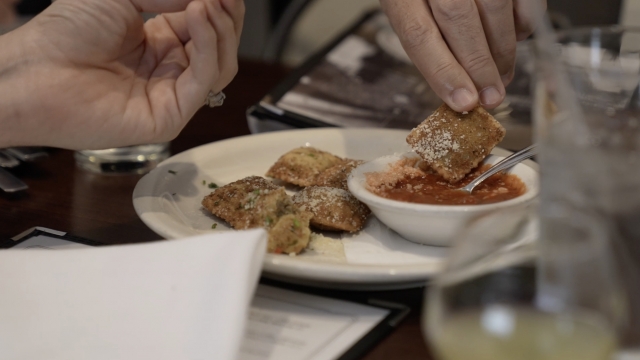Unlike its Italian cousin, this legendary St. Louis specialty is fried. So why is it called toasted ravioli?
"Everybody is watching their weight nowadays," said local restaurant owner Lance Ervin, adding that "toasted" sounds healthier than "fried."
Ervin's restaurant, Mama's On The Hill, claims to have invented the dish some 80 years ago when a tipsy chef accidentally dropped an order of ravioli into hot oil and still served it to a regular at the bar: Mickey Garagiola.
Mickey, who happened to be the brother of Baseball Hall-of-Famer Joe Garagiola, loved it.
And thus, a new dish was born.
Today, Ervin says the appetizer is a huge hit — and its preparation is trickier than you may think.
SEE MORE: Pasta panic: Italy holds crisis meeting to address soaring prices
First, on a stretched-out sheet of dough, you spread a thin layer of the filling. It's made of veal, pork, beef, carrot and celery. Then you stack another layer of dough, and you start rolling dozens of ravioli shapes.
After pre-cutting around each ravioli, you freeze them all for a few hours before breaking them apart and dredging them in flour, egg wash and breading.
Finally, you fry them, toss them in parmesan and parsley, and plate them with a serving of home-made marinara sauce.
The restaurant's other famous dish is an enormous bowl of spaghetti topped with a four-pound meatball.
If you finish it on your own within an hour, you get it for free. Only one person has managed to do so in the past 15 years.
Mama's On The Hill is in the heart of St. Louis' charming Italian neighborhood. And though the restaurant takes its Italian heritage seriously, we should point out that you likely won't find eight-pound spaghetti bowls or toasted ravioli in the old country.
Still, these two dishes represent what American food is all about: Taking culinary traditions passed down by generations of immigrants and giving them a delicious American twist.
Trending stories at Scrippsnews.com



